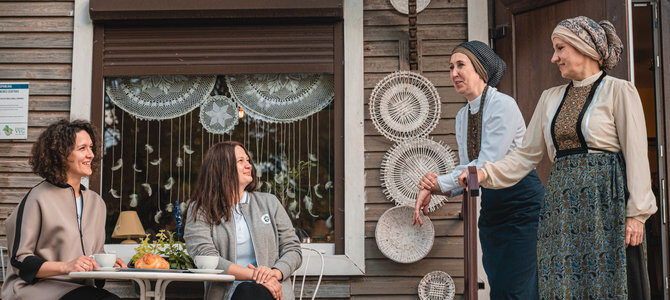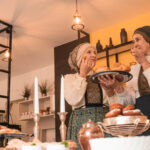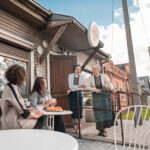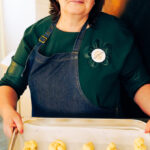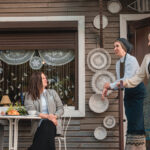A special place in the center of Lithuania: why does “Jewish” mean “backwards,” and why are packed buses arriving in this small town?
The small town of Krakės in the Kėdainiai region of central Lithuania is a special place. When you get there, you feel as if you’ve stepped into a different world. The community’s café Svetainė [Parlor] looks like an ordinary café, but thousands of people from all over Lithuania come by every year. It’s the Jewish cuisine which draws these people to Krakės.
A small group of enthusiasts from the Lithuanian town came up with a Jewish culinary and cultural education program called “One hundred and fifty years in the Jewish neighborhood: why Jewish means backwards.”
Krakės community center director Daiva Dubinkienė said initially the idea was to establish a cozy café in town, but the idea immediately grew to include an educational program.
The Life section of 15min.lt interviewed community center director Daiva Dubinkienė and the cook Lina Gaučiene, who makes Jewish dishes.
Q. We are meeting at the Svetainė café. When you cross the threshold, it really seems as if you’ve entered a different reality. It’s a cozy spot.
Dubinkienė: It was established using European Union support. We opened in the summer of 2020. We thought Krakės needed a good meeting place, a place to drink coffee. That’s how it started. We decided to open the café in a private home which we rented. The house was built in 1918, it’s very old…
We opened the café and it was news at first, everything was great and there was no lack of interest. But then quarantine began, and then another. It was during this period of quarantines that we bid on what are called soft projects, to receive up to 10,000 euros for preserving community activities and the culinary heritage.
We drafted a project and received financing. We created two educational programs. One was called “Why Does ‘Jewish’ Mean ‘Backwards?'” We looked for an interesting title which would hook people for a long time. Then we came up with another educational program…
When we created the first program about Jews we were greeted with a lot of skepticism by many people. Would it be interesting? Eighty years had passed since the Holocaust and we realized this was interesting to people, and they didn’t know much about it.
Q. Does Krakės have its own Jewish history?
Dubinkienė: Yes, many Jews lived here, it was a shtetl. That means that half or more the population was Jewish. Jews lived in Krakės until 1941, there was all the infrastructure established here, Krakės had a synagogue, school and mikva and kosher food was produced.
Full article and interview in Lithuanian here.
Photographs by Titas Valionis.


